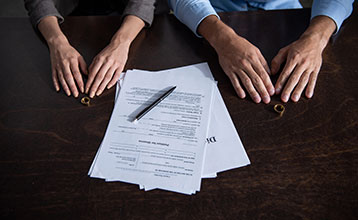There are 2 types of divorce in Singapore:
- Contested
- Uncontested (sometimes referred to as simplified or amicable divorce)
What is a Contested Divorce?
When a divorce is contested, it means that the husband and wife are unable to agree on the divorce, children custody issues, and how to divide their assets and maintenance. About 90 per cent of contested divorce cases in Singapore are settled during the course of the court action.
So many contested divorce cases are settled because the Family Court plays a very active and important role in encouraging and helping parties settle. In less than 10 per cent of contested cases, the parties cannot settle, and the Judge will hear the case and make the necessary decisions for them.
A Contested Divorce will take a longer time and will cost more money than an Uncontested Divorce.
What is an Uncontested Divorce?
A Simplified or Uncontested divorce basically means that both spouses agree to a divorce and all ancillary issues. The agreement must be reached before the divorce papers are filed to enable your lawyer to file the papers in the fast track simplified divorce hearing in the Family Court. You should then obtain your Interim Judgment in 4 weeks.
The common areas of agreement are usually centred on the following:
(a) What is the ground of divorce?
You and your spouse must agree to divorce based on any one of the following grounds: one party’s unreasonable behaviour, adultery, desertion, 3 years’ separation with consent and 4 years’ separation. From 1 July 2024, you can also file for divorce based on mutual agreement.
From 1 July 2024, married couples can cite divorce by mutual agreement as a reason for divorce if they agree that their marriage has broken down irretrievably.
Divorce by mutual agreement may be cited by those divorcing under the simplified track and those on the normal track if they are not contesting the divorce.
To cite Divorce by Mutual Agreement as a fact, parties must provide the court with reasons to conclude that their marriage has irretrievably broken down, and show that they have made efforts to reconcile.
They must also submit to the court the arrangements that will be made about their children and financial affairs.
(b) Who has the children?
Both spouses must agree on who will have care and control of the children. The children live with the party having care and control, and that spouse has the right to make daily living decisions for the children.
Next, you and your spouse must agree on the frequency of access that the other party has to the children. Is it reasonable, supervised or liberal access?
Both parties should also agree on whether they both will have joint custody of the children. Having “joint custody” means both parties must agree on the major issues of children education, hospitalisation and choice of religion. The norm in Singapore is to have “joint custody”, and we encourage parties to adopt “joint custody” unless it is clear that joint custody will not be in the children’s best interests.
(c) How are assets to be divided?
The most obvious asset that has to be divided is the matrimonial home. There are several common options when it comes to the division of the matrimonial home, and they are:
- Sale of the matrimonial property in the open market.
- The husband purchases the matrimonial home from the wife.
- The wife purchases the matrimonial home from the husband.
- The matrimonial home is transferred to one party.
The division of matrimonial assets can be quite tricky, especially if it involves outstanding bank loans, HDB flat eligibility and CPF monies. You will need an experienced divorce specialist (preferably with a conveyancing background) to help you.
(d) Maintenance
You and your spouse must also agree on who is to pay the children’s monthly maintenance and the amount of such maintenance. If the wife is not working or does not earn much, there should also be a consensus on whether and how much the husband pays the wife maintenance.
Why should you get a specialist divorce lawyer even if your divorce is uncontested?
Even when parties are going for an uncontested divorce, they will hire a specialist divorce lawyer like PKWA Law. Here are some reasons why:
- In an Uncontested Divorce, your lawyer’s role is crucial, especially where there are children issues, and a matrimonial home is your most substantial asset. Questions as to what should happen to the matrimonial home, what are HDB rules on sale or retention of a HDB flat, how other assets should be divided and how much maintenance is payable to the wife and the children are all important questions that you can get help if you engage a specialist divorce lawyer.
- The costs of a specialist divorce lawyer for an uncontested divorce is very affordable. At PKWA Law, our fees are affordable and transparent.
- Your lawyer should advise you on what you are entitled to, your obligations and help you to reach a fair agreement with your spouse. Your divorce lawyer also drafts all the necessary divorce paperwork to accurately capture what you and your spouse have agreed upon.
- Do not file an Uncontested Divorce if you do not have a lawyer. We have come across clients who did not get proper legal advice. As a result, they end up spending more time and money to try to vary the divorce order. This can be avoided if you get your divorce order right from the start.
- The key to achieving an agreement so that the divorce proceeds on an uncontested basis is to hire a good specialist divorce lawyer first to understand what you can get. It is pointless to argue and negotiate with your spouse over something that the court will never give you in the first place. Once you and your spouse understand your respective rights, what you can get and cannot get makes the negotiating process easy. It is therefore essential to know your rights and entitlement before you negotiate.
- Therefore, it is critical to hire a good divorce law specialist even in an uncontested divorce since your settlement may involve children and properties and assets worth substantial sums of money.
- It is important to note that your lawyer should give you full and proper advice based on the existing known facts, even if your divorce is uncontested. You certainly do not want a situation where you did not get proper legal advice and agreed to an unfair settlement.
The preparations of the Uncontested Divorce papers
In a Contested Divorce, your lawyer must check if you are required to attend the Mandatory Parenting Program, send the HDB Query (if you own a HDB flat), and draft the Proposed Parenting Plan and Proposed Matrimonial Plan. There is also other work your lawyer must prepare.
In contrast, in an Uncontested Divorce, the paperwork is simplified, and your lawyer will prepare and file the following divorce papers:
- Writ for Divorce
- Statement of Claim
- Statement of Particulars
- Affidavit of Evidence in Chief
- Draft Consent Order
Once the papers are signed, they are filed in the Family Justice Court. If you are the spouse applying for a divorce, you are the plaintiff. Your spouse is the defendant.
The Hearing Date
You can expect to have a hearing date for your Uncontested Divorce within 4 weeks of filing the papers. In an Uncontested Divorce, the divorce hearing is done in chambers without the parties or lawyers’ attendance. This means that no members of the public are allowed to watch the hearing.
How Quick is an Uncontested Divorce?
If you and your spouse can agree to the above issues, at PKWA Law, we usually obtain an Interim Judgment (conditional divorce) within 1 month of filing the papers.
After that, you should get your Final Judgment 3 months later. This concludes the divorce proceedings.
Fixed, clear & transparent fees
$1,490
No children, property or maintenance
$2,490
With children, property and maintenance


